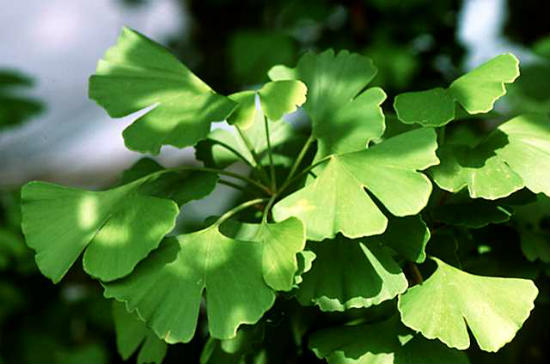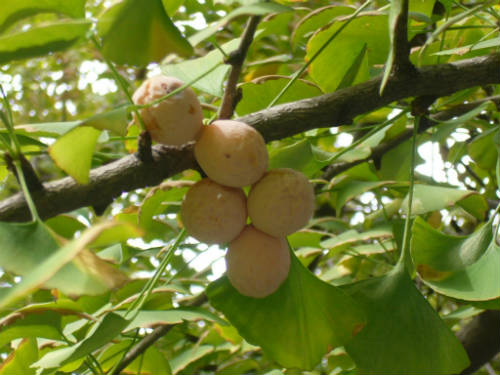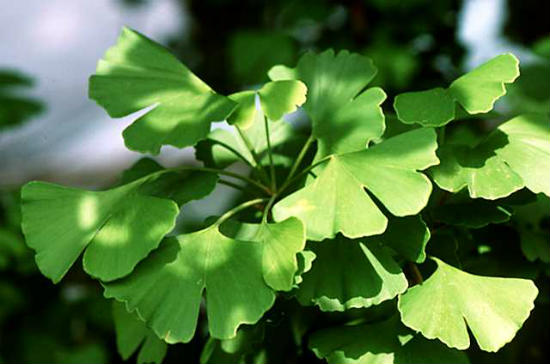
Ginkgo Biloba is a unique tree that’s cultivated in certain parts of China that’s developed a reputation as being a natural remedy to brain-related aging and mental decline.
Perhaps it’s nature’s remedy to senility?
Even if it isn’t, it’s still a fascinating herb. What other plant has been around since the paleolithic era, is impermeable to pesticides, was saved from extinction by buddhist monks, and provides a cure to Alzheimer’s?
However, a close look at the plant and its different health benefits paints a kind of weird picture of what the plant does and doesn’t do in your body.
Ginkgo Biloba’s Amazing History
Ginkgo Biloba has an unusually interesting history. It’s been around forever, with ginkgo fossils dating back over 240 million years ago when dinosaurs roamed the earth.
However, the plant was practically extinct when buddhist monks started cultivating it in their monasteries. For this reason, almost all ginkgo’s left on planet earth are practically identical in their genetic makeup, and years of cultivation have made the plant pretty damn resistant to pesticides, fungi, competing plants, and anything else nature can throw its way. It’s also one of the only plants that’s male and female and sexually reproduces.
Neat, huh?
And if that’s not cool enough, Gingko Biloba actually has a compound in them called gingkolides….because nothing else like them exists in the plant kingdom!
What Ginkgo Biloba Does In Your Body
Ginkgo has been used for medicinal purposes for over 5000 years, mostly as a tonic to age related diseases. Recent research suggests it does the following things in your body:
- Improve circulation, particularly to the brain
- Prevent platelets from forming in the blood
- Protect brain neurons from peroxyl radicals and scavenging peptides
- Improve nervous system metabolism
As you probably noticed, most of these functions are “brain related”, which is why it’s usually promoted as a food for aspiring smarty pants.
Health Benefits
Ginkgo has long been touted as a superfood that helps you improve concentration, memory and most frequently, as a way to prevent or improve age related neurodegenerative diseases such as Alzheimer’s and dementia.
That’s its reputation after some 5,000 odd years.
However, somewhat to my disappointment, the link between the folkloric wisdom and clinical results is a mixed bag in every sense of the word.
Most of the studies done on Ginkgo biloba are trash. Like other medical studies they suffer from small sample size, publication bias, and a failure to properly separate different confounding variables. This is a common problem in modern medicine.
As a result most studies done on Ginkgo Biloba don’t really say much of anything at all.
And what’s even worse is that the ones that do make you feel more confused than enlightened.
Alzheimer’s And Dementia
Most of the clinical studies done on Ginkgo have centered around its ability to improve neurological disorders like Alzheimers and other conditions that arise from your brain going past its “best if used by” date.
On this topic, the medical community flip flops quite a bit.
To give you an example, a paper published the Journal of American Medical Association in 2008 administered a double-blind placebo controlled study (the best kind) and found that Gingko did zilch for your cognitive abilities.
However, a very similar study conducted two years before found that Ginkgo had very significant impacts on people’s health.
Even when all the available researched is summoned together a common opinion can’t be reached. For example a summary of existing research on Ginkgo published in the British Journal of Clinical Pharmacology found that the plant was just as effective as many prescription drugs for treating cerebral insufficiency, but a similar paper done by the Cochrane organization found the exact opposite.
There are more examples.

Should You Use Gingko Biloba?
Based on what I’ve read, it seems like Gingko generally has a good effect on brain functioning, with the following caveats:
- It works best on older people
- You probably need a dosage of around 200-24o mg/day to experience an effect..
- Don’t expect your IQ to shoot through the roof or anything silly like that
I’d also add that while clinical trials done on humans taking Gingko are kind of “meh”, there’s some other laboratory evidence that demonstrate its ability to have positive physiological effects on your body, like its ability to protect neurons from free radical scavengers or hydrogen peroxide, which lends credence to the medical properties attributed to the tree, even if they haven’t shown up conclusively in certain studies.
Advice on Taking Gingko Biloba Supplements
Gingko supplements are not terribly expensive, and contrary to popular opinion, Ginkgo doesn’t seem to have any adverse side effects for the majority of people. It’s quite harmless. And there’s even a little bit of evidence that it might improve concentration among young healthy people as well.
For this reason taking a Gingko supplement is not a bad idea, but probably not necessary. If you do take one, be sure that the supplement provides at least 120 mg/serving of Gingko, as that seems to be the minimum amount required to notice an observable effect in most people.
Now foods and Mason Naturals both fulfill this requirement, as do some others.

[…] biloba is the most distinguished brain enhancing substances and also one of the most disputed. It’s probably not a remedy for specific conditions but is a docile enhancer of general […]
LikeLike
[…] using it specifically to improve your memory? It’s a crapshoot. (I’ve written about ginkgo biloba before). It’s the same reason drugs are so expensive. It’s impossible to tell what a […]
LikeLike